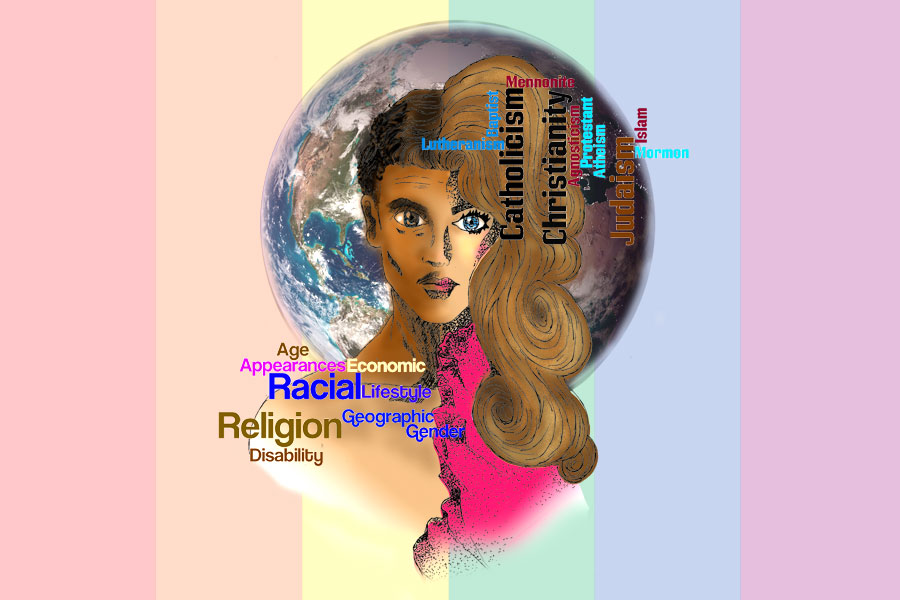In the Dark
Students share their experiences of feeling unaccepted in their own communities
November 8, 2016
Calvin feels trapped and has felt that way since 7th-grade, when he first realized that he was different.
“You don’t know what it’s like to be unnatural,” Calvin said. “You don’t know what it feels like to be ashamed of who you are.”
Calvin, a student here, is gay and in the closet. The name Calvin is used to protect the identity of this student.
He feels helpless, unaccepted and in the dark; all emotions that create the weight on his shoulders that grows heavier each day.
“[I have] to pretend to be someone else, hoping that everyone will at least accept the person I pretend to be,” Calvin said.
His mother and father are among the few people that are aware of Calvin’s struggle, and knowing what he is going through takes a toll on them as well.
“I have to watch my son go through one of the toughest things in his life,” Calvin’s mother said. “The worst part is I can’t always be there to tell him that everything is going to be okay.”
His mother has prayed for her son to find a place where he can feel accepted every day since revealed that he was gay. Her prayers have yet to be answered.
Calvin’s story begins with the arrival of a new student in his 7th-grade class. The boy was a transfer from another school and would eventually bring Calvin to the realization of who he really was.
“I liked him and I knew it,” he said. “I was never interested in talking about girls with all the other boys, but I liked talking about him. Over time it hit me that girls weren’t my thing, and I didn’t have a problem with it at the time.”
They became quick friends and ended up spending a lot of time with each other. They sat alone together at lunch, played alone together at recess, and hung out alone together on the weekends.
He became a target for the other boys and was teased relentlessly. Being insulted with homophobic remarks like “gay,” “fag,” and “queer” eventually became a way of life for him. After school, it wasn’t uncommon for him to cry for hours in his room, the only place he felt he could escape the bullying.
“They attacked my character and made me feel ashamed of who I was,” he said. “The worst part was that they never knew the truth. They went after the person that I really am, without even knowing it.”
Even here he hides, doing everything he can to avoid reliving his past. He still hears those hateful words once directed at him. They echo throughout the halls, linger in the classrooms, and resonate in the lunchroom.
The homophobic comments are not only a testament to the fact that homosexuality is associated with being a bad thing, but also that there are few that are willing to acknowledge and defend those driven into silence.
“I don’t hear [homophobic remarks] from everyone, but I also never hear anyone standing up against them,” Calvin said. “That’s where the problem is. There needs to be a feeling that someone has your back.”
Unlike Calvin, junior Kendall Fields doesn’t want to hide who he is. As a black teenager, he is aware of the glances and expressions that people like him get in the halls and the attitude society has towards them. As a strong advocate for racial acceptance and diversity, he has tried a number of times to change that attitude, but to no prevail.
The problems in society, such as police shootings or hate crimes, give Fields a sense of helplessness similar to that of Calvin.
“They give me the feeling that black people are also trapped in the closet with our mouths taped shut,” Fields said. “We don’t have a voice, and we have to watch those things happen.”
Fields makes it known that the tension is not one-sided, and encourages his peers to set their biases and work to promote brotherhood within the community and beyond.
“There’s the issue that both sides struggle to accept the idea that there is a problem,” Fields said. “They need to know that there are stereotypes that we put on each other and, more importantly, that they aren’t true.”
Fields hopes to promote brotherhood within the community and beyond and encourages his peers to do the same.
“It all starts off by letting us know that we are welcome,” Fields said. “After that, everything will take it’s turn.”
Diversity Director Armando Gilkes aims to change way students think and act. Doing so may be enough to give Calvin, Kendall and all those like them a place where they can feel accepted.
“A lot of times you are able to see that we have been desensitized,” Gilkes said. “We need to continue these deeper discussions so that we can begin to understand why we do the things we do and the effects our actions have on other people.”


Ray Stewart • Nov 9, 2016 at 10:17 am
Brendan, this might be one of the best articles to ever come from the Mirror. Keep up the good work!